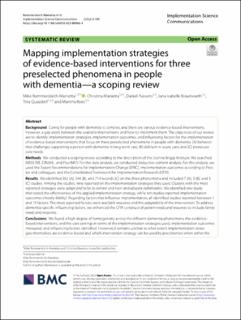Please use this identifier to cite or link to this item:
https://doi.org/10.21256/zhaw-28691| Publication type: | Article in scientific journal |
| Type of review: | Peer review (publication) |
| Title: | Mapping implementation strategies of evidence-based interventions for three preselected phenomena in people with dementia : a scoping review |
| Authors: | Rommerskirch-Manietta, Mike Manietta, Christina Purwins, Daniel Braunwarth, Jana Isabelle Quasdorf, Tina Roes, Martina |
| et. al: | No |
| DOI: | 10.1186/s43058-023-00486-4 10.21256/zhaw-28691 |
| Published in: | Implementation Science Communications |
| Volume(Issue): | 4 |
| Issue: | 1 |
| Page(s): | 104 |
| Issue Date: | 28-Aug-2023 |
| Publisher / Ed. Institution: | BioMed Central |
| ISSN: | 2662-2211 |
| Language: | English |
| Subjects: | CFIR; Dementia; ERIC; Implementation science; Outcome |
| Subject (DDC): | 610.73: Nursing 618.97: Geriatrics |
| Abstract: | Background: Caring for people with dementia is complex, and there are various evidence-based interventions. However, a gap exists between the available interventions and how to implement them. The objectives of our review are to identify implementation strategies, implementation outcomes, and influencing factors for the implementation of evidence-based interventions that focus on three preselected phenomena in people with dementia: (A) behavior that challenges supporting a person with dementia in long-term care, (B) delirium in acute care, and (C) postacute care needs. Methods: We conducted a scoping review according to the description of the Joanna Briggs Institute. We searched MEDLINE, CINAHL, and PsycINFO. For the data analysis, we conducted deductive content analysis. For this analysis, we used the Expert Recommendations for Implementation Change (ERIC), implementation outcomes according to Proctor and colleagues, and the Consolidated Framework for Implementation Research (CFIR). Results: We identified 362 (A), 544 (B), and 714 records (C) on the three phenomena and included 7 (A), 3 (B), and 3 (C) studies. Among the studies, nine reported on the implementation strategies they used. Clusters with the most reported strategies were adapt and tailor to context and train and educate stakeholders. We identified one study that tested the effectiveness of the applied implementation strategy, while ten studies reported implementation outcomes (mostly fidelity). Regarding factors that influence implementation, all identified studies reported between 1 and 19 factors. The most reported factors were available resources and the adaptability of the intervention. To address dementia-specific influencing factors, we enhanced the CFIR construct of patient needs and resources to include family needs and resources. Conclusions: We found a high degree of homogeneity across the different dementia phenomena, the evidence-based interventions, and the care settings in terms of the implementation strategies used, implementation outcomes measured, and influencing factors identified. However, it remains unclear to what extent implementation strategies themselves are evidence-based and which intervention strategy can be used by practitioners when either the implementation outcomes are not adjusted to the implementation strategy and/or the effects of implementation strategies are mostly unknown. Future research needs to focus on investigating the effectiveness of implementation strategies for evidence-based interventions for dementia care. |
| URI: | https://digitalcollection.zhaw.ch/handle/11475/28691 |
| Fulltext version: | Published version |
| License (according to publishing contract): | CC BY 4.0: Attribution 4.0 International |
| Departement: | School of Health Sciences |
| Organisational Unit: | Institute of Nursing (IPF) |
| Appears in collections: | Publikationen Gesundheit |
Files in This Item:
| File | Description | Size | Format | |
|---|---|---|---|---|
| 2023_RommerskirchManietta-etal_Evidence-based-intervention-implementation-strategy-dementia.pdf | 1.93 MB | Adobe PDF |  View/Open |
Show full item record
Rommerskirch-Manietta, M., Manietta, C., Purwins, D., Braunwarth, J. I., Quasdorf, T., & Roes, M. (2023). Mapping implementation strategies of evidence-based interventions for three preselected phenomena in people with dementia : a scoping review. Implementation Science Communications, 4(1), 104. https://doi.org/10.1186/s43058-023-00486-4
Rommerskirch-Manietta, M. et al. (2023) ‘Mapping implementation strategies of evidence-based interventions for three preselected phenomena in people with dementia : a scoping review’, Implementation Science Communications, 4(1), p. 104. Available at: https://doi.org/10.1186/s43058-023-00486-4.
M. Rommerskirch-Manietta, C. Manietta, D. Purwins, J. I. Braunwarth, T. Quasdorf, and M. Roes, “Mapping implementation strategies of evidence-based interventions for three preselected phenomena in people with dementia : a scoping review,” Implementation Science Communications, vol. 4, no. 1, p. 104, Aug. 2023, doi: 10.1186/s43058-023-00486-4.
ROMMERSKIRCH-MANIETTA, Mike, Christina MANIETTA, Daniel PURWINS, Jana Isabelle BRAUNWARTH, Tina QUASDORF und Martina ROES, 2023. Mapping implementation strategies of evidence-based interventions for three preselected phenomena in people with dementia : a scoping review. Implementation Science Communications. 28 August 2023. Bd. 4, Nr. 1, S. 104. DOI 10.1186/s43058-023-00486-4
Rommerskirch-Manietta, Mike, Christina Manietta, Daniel Purwins, Jana Isabelle Braunwarth, Tina Quasdorf, and Martina Roes. 2023. “Mapping Implementation Strategies of Evidence-Based Interventions for Three Preselected Phenomena in People with Dementia : A Scoping Review.” Implementation Science Communications 4 (1): 104. https://doi.org/10.1186/s43058-023-00486-4.
Rommerskirch-Manietta, Mike, et al. “Mapping Implementation Strategies of Evidence-Based Interventions for Three Preselected Phenomena in People with Dementia : A Scoping Review.” Implementation Science Communications, vol. 4, no. 1, Aug. 2023, p. 104, https://doi.org/10.1186/s43058-023-00486-4.
Items in DSpace are protected by copyright, with all rights reserved, unless otherwise indicated.